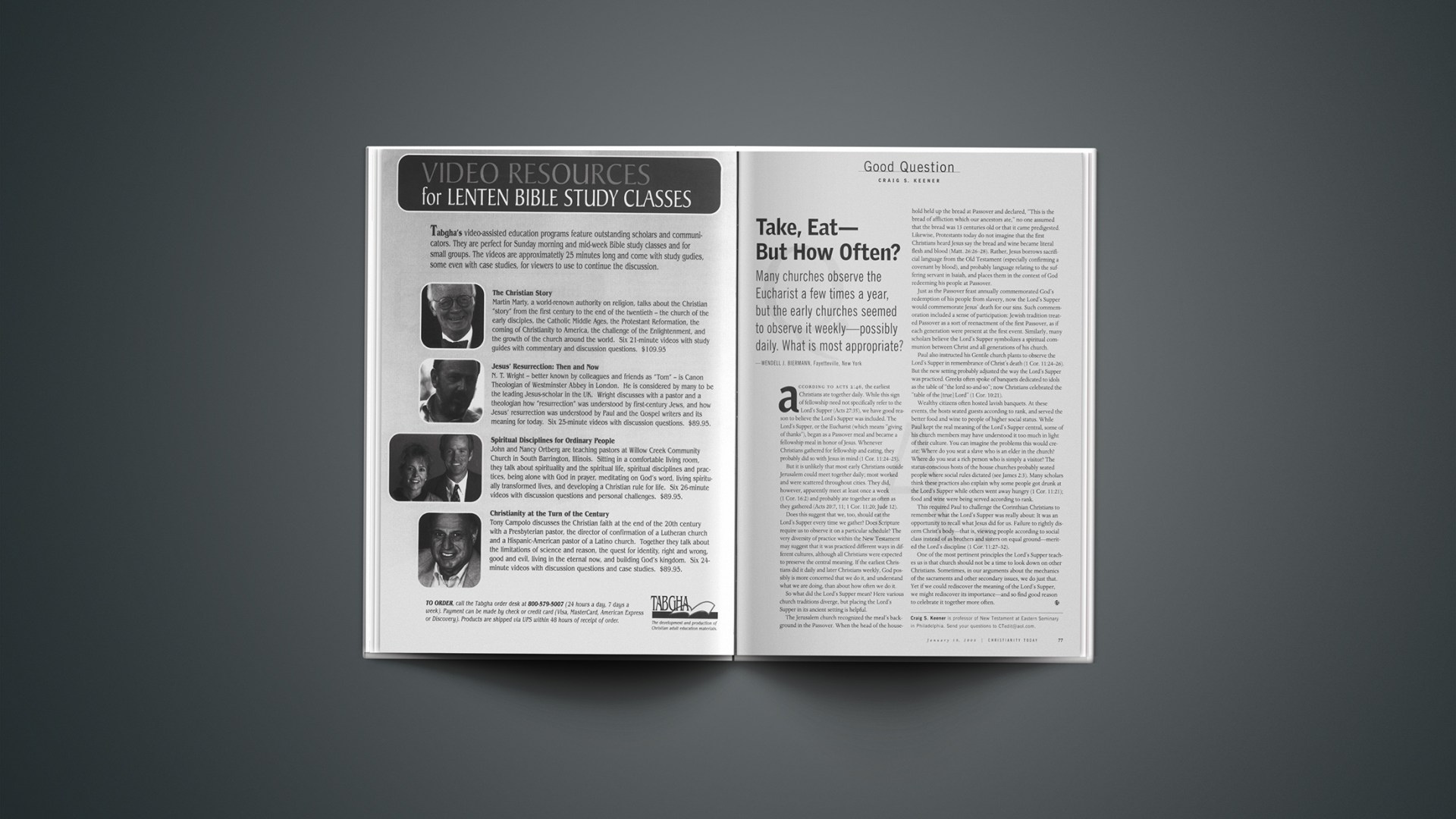According to acts 2:46, the earliest Christians ate together daily. While this sign of fellowship need not specifically refer to the Lord's Supper (Acts 27:35), we have good reason to believe the Lord's Supper was included. The Lord's Supper, or the Eucharist (which means "giving of thanks"), began as a Passover meal and became a fellowship meal in honor of Jesus. Whenever Christians gathered for fellowship and eating, they probably did so with Jesus in mind (1 Cor. 11:24-25).

But it is unlikely that most early Christians outside Jerusalem could meet together daily; most worked and were scattered throughout cities. They did, however, apparently meet at least once a week (1 Cor. 16:2) and probably ate together as often as they gathered (Acts 20:7, 11; 1 Cor. 11:20; Jude 12).
Does this suggest that we, too, should eat the Lord's Supper every time we gather? Does Scripture require us to observe it on a particular schedule? The very diversity of practice within the New Testament may suggest that it was practiced different ways in different cultures, although all Christians were expected to preserve the central meaning. If the earliest Christians did it daily and later Christians weekly, God possibly is more concerned that we do it, and understand what we are doing, than about how often we do it.
So what did the Lord's Supper mean? Here various church traditions diverge, but placing the Lord's Supper in its ancient setting is helpful.
The Jerusalem church recognized the meal's background in the Passover. When the head of the household held up the bread at Passover and declared, "This is the bread of affliction which our ancestors ate," no one assumed that the bread was 13 centuries old or that it came predigested. Like wise, Protestants today do not imagine that the first Christians heard Jesus say the bread and wine became literal flesh and blood (Matt. 26:26-28). Rather, Jesus borrows sacrificial language from the Old Testament (especially confirming a covenant by blood), and probably language relating to the suffering servant in Isaiah, and places them in the context of God redeeming his people at Passover.
Just as the Passover feast annually commemorated God's redemption of his people from slavery, now the Lord's Supper would commemorate Jesus' death for our sins. Such commemoration included a sense of participation: Jewish tradition treated Passover as a sort of reenactment of the first Passover, as if each generation were present at the first event. Similarly, many scholars believe the Lord's Supper symbolizes a spiritual communion between Christ and all generations of his church.
Paul also instructed his Gentile church plants to observe the Lord's Supper in remembrance of Christ's death (1 Cor. 11:24-26). But the new setting probably adjusted the way the Lord's Supper was practiced. Greeks often spoke of banquets dedicated to idols as the table of "the lord so-and-so"; now Christians celebrated the "table of the [true] Lord" (1 Cor. 10:21).
Wealthy citizens often hosted lavish banquets. At these events, the hosts seated guests according to rank, and served the better food and wine to people of higher social status. While Paul kept the real meaning of the Lord's Supper central, some of his church members may have understood it too much in light of their culture. You can imagine the problems this would create: Where do you seat a slave who is an elder in the church? Where do you seat a rich person who is simply a visitor? The status-conscious hosts of the house churches probably seated people where social rules dictated (see James 2:3). Many scholars think these practices also explain why some people got drunk at the Lord's Supper while others went away hungry (1 Cor. 11:21); food and wine were being served according to rank.
This required Paul to challenge the Corinthian Christians to remember what the Lord's Supper was really about: It was an opportunity to recall what Jesus did for us. Failure to rightly discern Christ's body-that is, viewing people according to social class instead of as brothers and sisters on equal ground-merited the Lord's discipline (1 Cor. 11:27-32).
One of the most pertinent principles the Lord's Supper teaches us is that church should not be a time to look down on other Christians. Sometimes, in our arguments about the mechanics of the sacraments and other secondary issues, we do just that. Yet if we could rediscover the meaning of the Lord's Supper, we might rediscover its importance-and so find good reason to celebrate it together more often.
Craig S. Keener is professor of New Testament at Eastern Seminary in Philadelphia.
Related Elsewhere
In October 1998, Keener answered the following question: "Most evangelicals don't ask women to wear a head covering when praying or expect slaves to obey masters-because "that was just their culture." Yet many do forbid women to preach-because "this is a spiritual principle not bound by culture." How do I determine which directives are culture-bound and which are not?"Craig Keener also wrote an article on Jesus' trial for our sister publication Christian History.Earlier Directions columns include:
- Are Christians Required to Tithe?
- Is Revelation Prophecy or History?
- You're Divorced-Can You Remarry?
- If Grace Is Irresistible, Why Evangelize?
- If I'm an Evangelical, What Am I?
- A Cracked Code
- Committing the Unforgivable Sin
- What Bible Version Did Jesus Read?
- Did God Die on the Cross?
- You Must Be Born Again-but at What Age?
- Was the Revolutionary War Justified?
- Can the Dead Be Converted?
- Cloaked in Mystery
- Is Hell Forever?
- Denominations: Divided We Stand
- Did Paul Baptize for the Dead?
- Do Demons Have Zip Codes?
- Doubting Thomas's Gospel
Copyright © 2000 Christianity Today. Click for reprint information.











